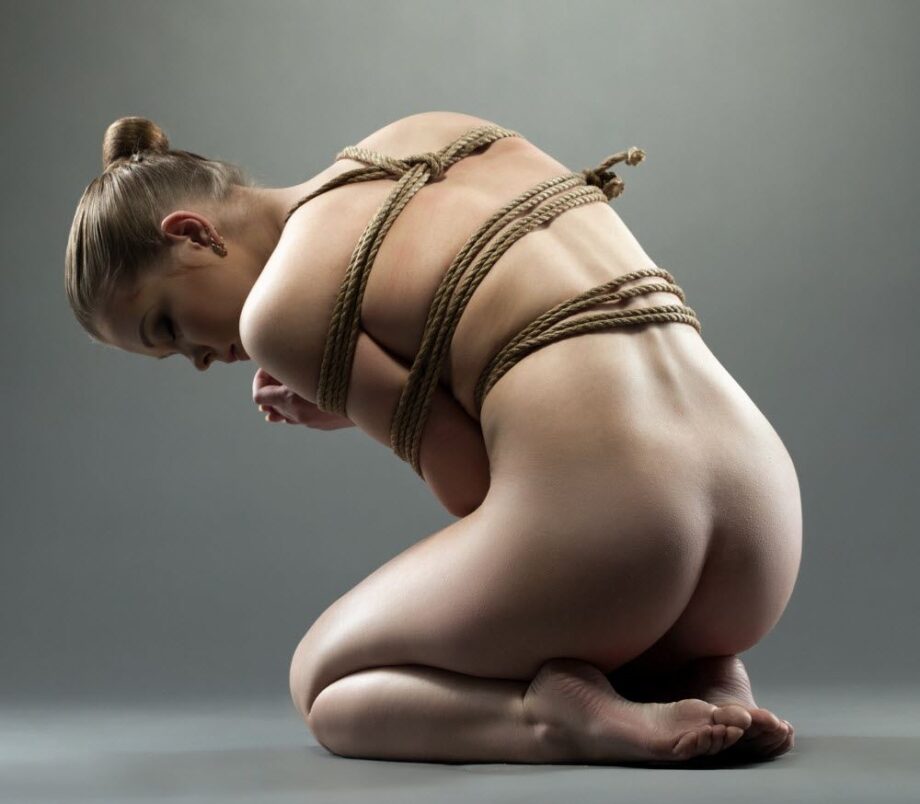Rope has a special place in many kinksters' hearts. Of all the types of bondage, rope bondage is the one that arguably looks the most artistic. It also makes for the best connection between rigger and bunny. There are few things more intimate than running a rope along someone's body and limbs, or feeling hands and rope run along and manipulate every inch of you.
Sounds fun, right? Now, there are several types of rope bondage. There's decorative bondage, where the goal is not so much to tie you up but to dress you in rope. Harnesses, corsets, and rope bras/panties are usually decorative. There's floor bondage, where a bottom is tied but remains on the floor. One more type is suspension bondage, where the bottom is tied, then suspended in the air, supported only by rope.
Just like there are all kinds of rope play, there are all kinds of rope, too. Not every rope is good for every kind of play. Choosing the right rope can make the difference between an enjoyable experience and an unfortunate accident (especially in the case of suspension bondage). Here are a few types of rope that riggers use, and their best assigned purposes.
| Looking to get all tied up? Check out the bondage gear in our Sex Toy Directory . |
The Characteristics of Rope
Riggers evaluate rope based on the following characteristics:
- Flexibility
- Texture
- Friction
- Stretch
- Durability
- Strength
All of these are important to consider when choosing the right type of rope for your activities. Friction is especially important when dealing with knots. A low-friction rope is more likely to slip or tighten. Texture is important for your bottom's skin; some ropes, like sisal or manila, are generally not appropriate because of their very rough texture.
Strength and stretch matter most when it comes to full or partial suspension work. You don't want to use a weak rope for suspending someone!
Read: How to Tie Bondage Knots
Synthetic Bondage Rope
A lot of bondage beginners will use some kind of synthetic rope to start. It's cheap, widely available in hardware stores, easy to clean, and fairly easy to manipulate. Nylon and polyester are the typical materials.
Nylon Rope
Nylon rope is very flexible, soft to the touch, and has low friction and a little bit of stretch. It is very durable and very strong. It's a good choice to get you started, especially if you're interested in Western bondage (as opposed to Japanese shibari). It comes in many colors and sizes, which lets you be artistic. However, the low friction means that knots are likely to slip or tighten, so riggers must ensure the safety of their bottoms with extra wraps. Nylon rope is excellent for floor play and damsel-in-distress type bondage, decorative bondage, and for support in suspension bondage.
Polyester Rope
Polyester rope is also cheap, strong and durable. Its moderate flexibility and rougher texture make it a less likely choice for bondage work. It's still viable, but not a popular choice in general.
Other types of rope, like synthetic hemp and polypropylene rope, are not really suitable for bondage because of their plastic like texture and low flexibility.
Natural Bondage Rope
For most experienced riggers, natural materials is where it's really at. The favorite material depends on the activity and rigger; for example, shibari enthusiasts tend to use jute, which is the traditional choice.
Jute Rope
Just rope is the favorite choice for both floor and suspension shibari riggers. Jute is flexible and a little rough on the skin, has high friction and low stretch, and it has good strength but low durability. Well-treated jute rope can be made to feel softer on the skin, but it needs to be replaced frequently. It's easy to dye as well.
Hemp Rope
Hemp rope has the same characteristics as jute, but has a noticeable smell and is a bit heavier. Many riggers enjoy hemp because it softens with time. It's also easier to find than jute. It's strong enough to manage suspension work as well.
Linen Rope
Linen rope is softer and lighter than jute or hemp, but shares the same characteristics.
Cotton Rope
Cotton rope is a good choice for beginners because it's cheap and easily available. It's quite flexible, feels soft on the skin, provides moderate friction, and has a little stretch. However, the durability and strength of cotton rope is low. Cotton can be used for the same activities as nylon rope, but it isn't suitable for suspension work because of its low strength. It's great for decorative work as well. Cotton rope is also easy to dye, which means you can buy it undyed and make it any color that you want.
Silk and Bamboo Rope
Silk and bamboo are used for luxury ropes. These are quite expensive, yet provide stunning results when used. They have the best characteristics of both natural and synthetic rope (flexible, soft, good friction, a low stretch, some durability, and good strength), but this comes at a cost. Bamboo has the bonus of being naturally anti-bacterial and shiny like nylon.
Sisal, manila, and coir are not suitable for bondage work because they are stiff and rough. Avoid them.
The Best Rope for the Job
If you're a beginner, nylon and cotton are your best choices. They are soft, easy to work with, cheap, and widely available. As you gain confidence and knowledge, you can move on to more specialized ropes like jute and hemp, depending on the purpose.


















